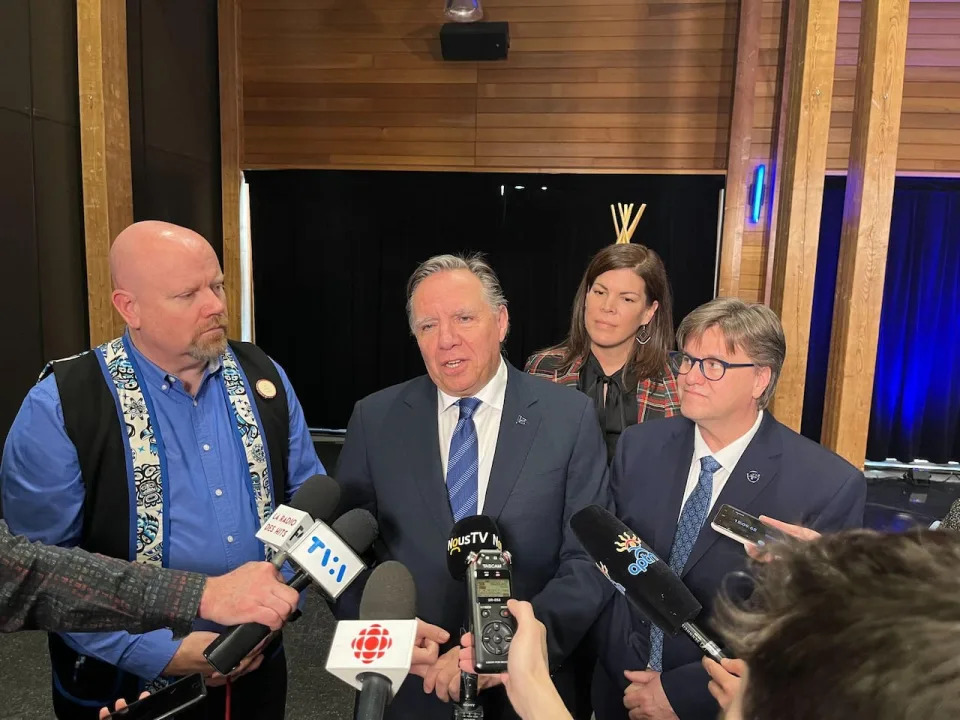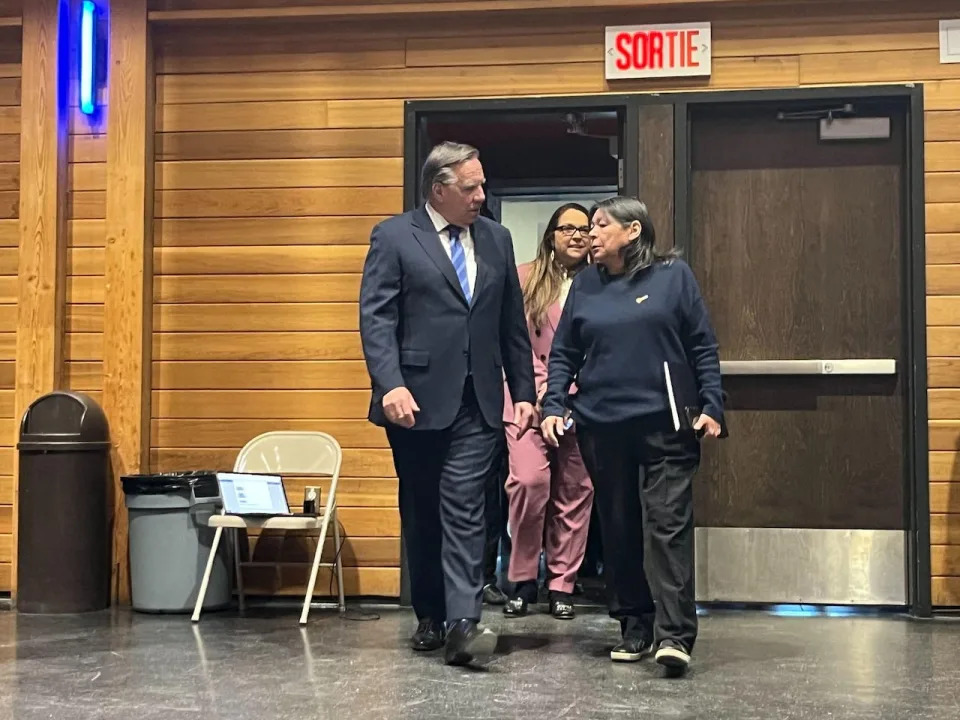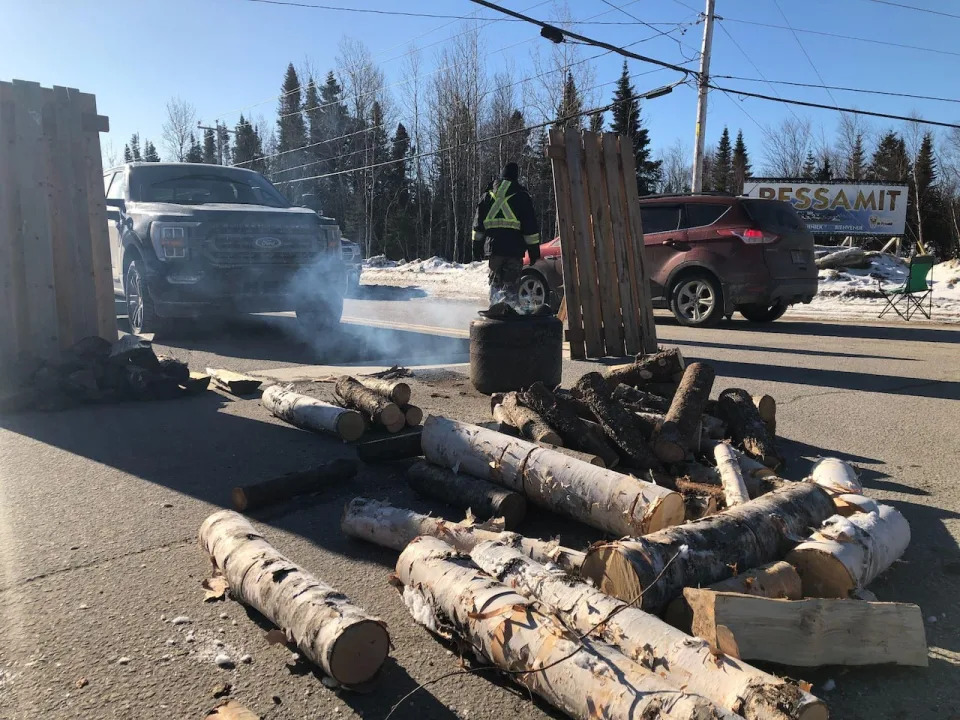CBC
Fri, February 16, 2024

Premier François Legault spoke to reporters following the signing of a framework agreement with the Innu nation of Pessamit. He was joined by Quebec's Indigenous affairs minister, Ian Lafrenière (left), CAQ MNAs Yves Montigny (right) and Katéri Champagne-Jourdain. (Renaud Chicoine-Mckenzie/Radio-Canada - image credit)
The Innu First Nation of Pessamit will have to eventually hold a referendum following some disagreement in the community over the signing of its $45-million agreement described by both its council and the Quebec government as "historic."
The framework agreement, which also involves Hydro-Québec, was signed on Thursday.
It would enable the provincial utility to discuss potential projects in the area and increase electricity production. The agreement includes the development of windmill power. In return, the community would receive millions for housing and local development projects between now and 2030 to create a social development fund.
The money would be used to build housing in Pessamit — something the chief, Marielle Vachon, says is in short supply.
Premier François Legault, who visited the community located 350 kilometres northeast of Quebec City on Thursday, says this is a major step forward.
"I hope there will be agreements like this with each of the communities and nations," said Legault on Thursday. "What we want is to reconcile and that we work together on projects on a territory that we share."

The chief of Pessamit, Marielle Vachon, welcomed François Legault to the community. (Renaud Chicoine-Mckenzie/Radio-Canada)
But the deal has been the subject of debate within the Innu community as it involves the shelving of a $500 million lawsuit that the community launched against provincial and federal governments.
The lawsuit claims their ancestral rights were violated and their land flooded when they were not consulted before Hydro-Québec built 13 stations and 16 dams over their land 70 years ago.
The controversy over the new deal prompted chief Vachon to announce Friday that once talks are over, the community will hold a referendum.
"That's where we're headed. It's important in terms of negotiations," said Vachon.
This decision also comes after demonstrators set up a blockade ahead of the premier's visit, saying community members had not been sufficiently consulted.
For several hours Thursday morning, demonstrators only allowed Indigenous people or trucks carrying essential goods into the community. Radio-Canada reports that Pessamit police were involved in the dismantling of the blockade before Legault entered the community.

A blockade was set up at the entrance of Pesssamit to filter people who entered the community. (Paul Fontaine/Radio-Canada)
The instigator of the blockade, Jérôme Charles St-Onge, said the meeting between elected officials from Pessamit and the province shouldn't have been held behind closed doors.
"We're asking elected officials and chiefs to hold a referendum, to open the community hall to the people," said St-Onge.
"Whether we vote yes or no, or cancel the $45 million, it doesn't look good. It's a beautiful farce."
Dr. Stanley Vollant says some people are worried this agreement could mean even greater destruction of the land.
The doctor at Notre-Dame hospital in Montreal who is from Pessamit sees the latest deal as a good start, but says Pessamit deserves more, especially for social development.
"I [have] a little bit mixed feeling because I thought it's going to be more than $45 million," said Vollant.
"That is not enough and I think we have already discussed in my nation that it should be around $300 [million] to $500 million."
Quebec's Indigenous affairs minister, Ian Lafrenière, says this agreement is the start of a relationship of trust, but it won't be easy.
"You can understand how hard it is for the community members to talk about Hydro-Québec. For them, they've been living with all those impacts," said Lafrenière.
"We need to start a new relationship. And again, the $45 million doesn't mean that it's going to cover everything that happened in the past."
Lafrenière said on Thursday afternoon that it may take between 12 to 24 months to come up with a complete agreement that would lead to consultations and the referendum.
No comments:
Post a Comment